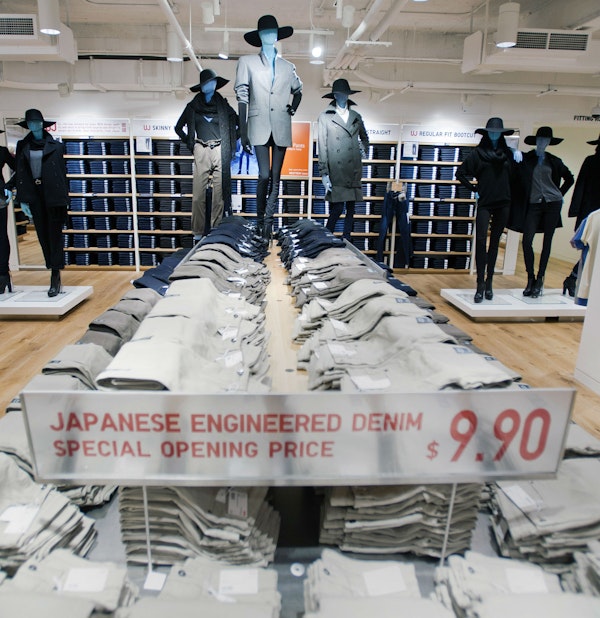The Working Class and Globalization
Economic gains from globalization are an abstraction to many in the working class, fueling a push back against the global economy. The question is, how do you reach people who have lost confidence in that economy?
 Effects and benefits of globalization (Paul Taggart/Getty Images)
Effects and benefits of globalization (Paul Taggart/Getty Images)
Rod Dreher is senior editor at the American Conservative, where he blogs almost around the clock. A resident of south Louisiana, and a former writer for National Review, the Dallas Morning News, and New York Post, Dreher regularly comments on the challenges facing working-class Americans. The author of Crunchy Cons, his new book is The Benedict Option: A Strategy for Christians in a Post-Christian Nation.
In this email exchange with Catalyst Editor William McKenzie, Dreher discusses what he considers the plight of those caught up in the ongoing debates over globalization, trade, and even nationalism.
You have written about and followed working-class Americans, especially white working-class Americans. Why do you think so many of them have pushed back against the forces of globalization?
Because they haven’t benefited from it, at least not as much as they have lost. Not too many working-class folks are going to be able to do a sophisticated cost-benefit analysis of trading patterns over the past three decades, and explain how they have been affected by globalization.
What many working-class folks see is that there used to be good jobs for them, and now there are fewer of those jobs. They see that their adult children, and their grandchildren, have less job security than they do. They see the rich getting richer and everybody else stalling out or declining.
It doesn’t make sense to talk about overall economic gains to the American economy when so many of those gains have aggregated towards the top. You can also talk about how much cheaper globalization makes everyday consumer products, and how much that benefits the working class, but that does not compensate for the loss of meaningful employment, versus service-sector jobs that pay far less and have less dignity than what they replaced.
Finally, it is true that globalization has helped hundreds of millions around the world out of grinding poverty. But they are an abstraction to working-class Americans who have been made to bear a far disproportionate amount of the burden from policies that benefited foreigners — and well-to-do Americans.
It is true that globalization has helped hundreds of millions around the world out of grinding poverty. But they are an abstraction to working-class Americans who have been made to bear a far disproportionate amount of the burden from policies that benefited foreigners — and well-to-do Americans.
Which brings us to the cultural side of the reaction. The illegal immigration boom started around 1995, and didn’t level off until a few years ago.
If you were in Dallas during that time, for example, and you were a middle-class native, you probably saw some practical benefits — better restaurants, cheaper labor, and so forth — without too many down sides. But if you were a working class native, you may have seen your kids’ public schools fill up with children who couldn’t speak the language. It became much harder to use the public hospitals because waiting rooms were jammed with immigrants. Your neighborhood might have gone from relatively stable to being dominated by immigrants who did not speak your language and did not share your way of life.

I remember around 2005 or so visiting an elementary school in a poor part of Dallas, a Christian school serving the children of immigrants, and listening to a sweet Latino boy deliver a history report about his hero, Santa Anna. You have to be crazy to think that there won’t be a reaction from the native working class (at least the white working class) at some point.
This is especially true when Democratic elites portray them as racist and xenophobic for objecting to what’s happening to the country, and Republican elites look down their noses at them for the same reason, and wonder why these benighted blue-collar people won’t embrace the glories of the free market.
You can only shout “Reagan!” at people so many times before it ceases to have a mesmerizing effect. As the Republican Party learned last year.
I could throw a bunch of statistics back at you about how automation has actually changed the job place more than global trade or how globalized production helps working families by keeping the price of products like cars and jeans lower. But I think what you are describing is a far more visceral response. It’s a fear of losing what was. So, if you’re like me, and think it is important that America not retreat from the global economy, how do you reach people who feel the way you describe?
You’ve hit on one of the defining political issues of the period into which we have now entered. It’s one in which the familiar ideological stances of left and right don’t offer much help. Nor does the new populism, as articulated by Trump – if “articulated” is the right word – have a clear idea what to do about automation, for example. We are all, to some extent, flying blind.
I don’t think the fear is based on nothing. The numbers on income stagnation, a slowdown in productivity, the loss of good manufacturing jobs, and so forth, are undeniable. People feel in their guts that something has gone very wrong – and they’re not wrong. I don’t believe that Trump has the slightest idea how to get the economy back on track, but who could possibly have confidence that the neoliberal establishmentarians of the Democratic and Republican parties do?
A lot of folks on both the left and the right sensed that those establishments were satisfied to manage the decline of the middle class. This is what the Bernie Sanders phenomenon was about on the left, by the way. Sanders didn’t have the answers either, but at least he was speaking to the deep sense of alarm that people have, and the erosion of authority in the normative institutions – especially the political parties – in contemporary America.
The economy cannot be easily separated from the rest of life. It matters a lot to the sense of self-worth of workers that their labor is meaningful. Cheaper cars and jeans cannot compensate for the loss of work with dignity.
This problem is not quantifiable, which, in the minds of many economists and others, renders it unreal. But it’s happening. I am doing better economically than most people my age, but now that my first child is getting ready for college, it occurred to me the other day that I do not believe that my children will be more secure economically than their mother and I are.
I grew up in a working-class home in the 1970s, and despite the economic travails of that era, my generation was raised with the confidence that we would be better off than our parents. That was the natural order of things, or so we thought.
I grew up in a working-class home in the 1970s, and despite the economic travails of that era, my generation was raised with the confidence that we would be better off than our parents. That was the natural order of things, or so we thought.
It didn’t hit me till the other day that I don’t know anybody who believes that anymore. Most of us, in my experience, believe that our kids will have to fight hard simply to hold on to what we have. The crash of 2007 and 2008 shattered a lot of people’s faith in the economic future, and I don’t think it has recovered.
We can argue over the extent to which globalization has caused this widespread economic destabilization, but I think we can agree that it will be politically impossible to return to the status quo. Brexit and Trump show us that. In the future, politicians of the left and right across the West will have to find a way to rein in market forces for the sake of social stability.
We can argue over the extent to which globalization has caused this widespread economic destabilization, but I think we can agree that it will be politically impossible to return to the status quo.
Pope John Paul II said that the market was made for man’s flourishing, not man for the market’s. Before the present moment, one might have considered that to be religious idealism. Now, it’s political common sense, and leaders who don’t understand the wisdom there are going to be swept aside. Greater automation, though, is going to make the job of politically managing the decline of manual labor even more difficult.
 Modern assembly line (Nataliya Hora/Shutterstock)
Modern assembly line (Nataliya Hora/Shutterstock)
What I don’t hear too many people on the left or the right talking about is the role that moral libertarianism plays in the unraveling of our society. I’ve been reading an advance copy of “Move Fast And Break Things,” a hard-hitting book by Jonathan Taplin, director emeritus of the Annenberg Innovation Lab.
The book’s title was Facebook’s motto for a while, meant to express Mark Zuckerberg’s ethos of disruption, which is what they call “creative destruction” these days. Taplin writes about how the form capitalism has taken in the digital age has tremendously negative consequences for democratic self-government. His book goes into detail about the Silicon Valley ideology of “techno-libertarianism” – Taplin’s term – has come to exercise outsized power in postindustrial America. It’s an economics book, mostly.
What I find so fascinating about the book is how the economic libertarianism Taplin talks about has developed alongside an equally powerful moral libertarianism – one that cannot help but have serious social and political effects. Put simply, radical individualism is powering the digital economy and dissolving old forms of doing business, just as it is powering social change, and dissolving old customs and forms.
The loss of community has been something social critics of the left and the right have been talking about since the end of the Second World War. Now we are seeing the family falling apart. A professor at a conservative evangelical college told me not long ago that he doubted whether many of his students would ever form stable families. When I asked him why, he said, “Because so few of them have ever experienced one.”
Capitalism is tearing apart the social institutions – families and communities — it needs to sustain itself. Don’t misunderstand – I’m not advocating socialism. But we have to understand what the dynamics of our individualistic cultural and economic values are doing to our social fabric, and deal with the world as it is, not as we wish it were.
True, we have to deal with realities, and the reality is that some folks are really pushing back against the global capitalist system. Yet finding ways to make it work for more people is far different than ditching the system.
I rather keep tinkering with making it work better than let our current resistance lead us down a bad path. After all, we do want to sustain those many jobs that benefit from the movement of capital, labor, and goods across borders. And we want to keep benefiting from goods that cost less because they were produced overseas.
Let me offer another thought: It seems to me that being a globalist and a nationalist are not mutually exclusive. You can be a proud American and support the global economy. I bring that up because fear of losing one’s national identity seems to be wrapped up in the pushback against globalization.
What do you think? Must globalism and nationalism be at odds?
Well, let’s stipulate that a full retreat from globalism is not possible. We’re not going to return to mercantilism. The only realistic path forward is going to be some sort of pragmatic, limited retreat from globalist ideals.
Well, let’s stipulate that a full retreat from globalism is not possible. We’re not going to return to mercantilism. The only realistic path forward is going to be some sort of pragmatic, limited retreat from globalist ideals.
The European Union is constructed according to these market über alles ideals, and maintaining the euro, which binds the EU together, has crushed Spain and Greece, severely retarding their economic recovery and making them more or less vassals of Germany.
This is at the very least politically unsustainable. In the same way that FDR saved capitalism through the New Deal, which reined in the market to socially beneficial ends, these rising nationalist politicians may – may – save capitalism in our day by imposing limits on it.
I do think, though, that there is a fundamental irreconcilability between globalism and nationalism. Globalism is the ideology that all of our American elites believe in. The nation – its borders, its history, its customs, and its peoples – are not as important to them as the free flow of goods, money, and people as they wish. Nationalism, at its best, says that the elites in society ought to feel some palpable sense of allegiance to their own flesh-and-blood people, not universalist abstractions. It’s a matter of solidarity.
What remains to be seen is whether we still have much basis for solidarity. Over the last half-century, America has become so obsessively individualistic. We’ve taken a basic sense of national unity for granted.
What remains to be seen is whether we still have much basis for solidarity. Over the last half-century, America has become so obsessively individualistic. We’ve taken a basic sense of national unity for granted
Now, in this age of fracture, we are going to be sorely tested to see if we even have the capacity for national solidarity. Both right and left are to blame for this, in different ways, but I am especially worried by the left’s obsession with race, gender, and sexual identity politics. Progressives never seem to understand the demons on the right that their identity politics are summoning and validating. Sometimes I think we’re living in Weimar America.
Isn’t that a pretty dark way to end this? I am impressed by the many local communities, nonprofits, and other forms of civic institutions that are involved in issues like education, mental health care, and mediating disputes. Can’t we find some solidarity there?
Yes, it’s dark, but that darkness doesn’t describe all of America by any means. I am thinking of the un-employed or under-employed white men I’ve heard from recently who tell me that they find themselves drawn against their conscience to white nationalism. All of them say that they’re sick and tired of being blamed for all the problems of the world, especially when their own lives are miserable and without real prospects of getting better.
A white evangelical friend dropped out of a racial reconciliation group in his city because militant progressives came to dominate it, and drove away all who disagreed with their dogmatism. He said it was too exhausting. My fear is that as Trump and Trump’s enemies inflame resentments, it’s going to be harder for people to find solidarity, even in non-controversial lines of work. These next four years are going to be mighty long.
-
Previous Article Globalization is Dead – Long Live Globalization An Essay by Matthew Rooney, Director, Economic Growth Initiative, George W. Bush Institute
-
Next Article Supporting Working Parents thru Growing the Middle Class An Essay by Abby McCloskey, Founder, McCloskey Policy LLC and Former Advisor to Jeb Bush and Rick Perry

